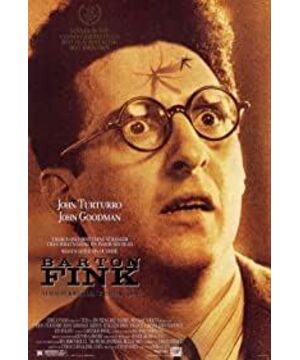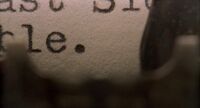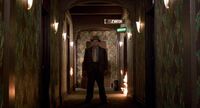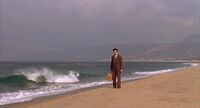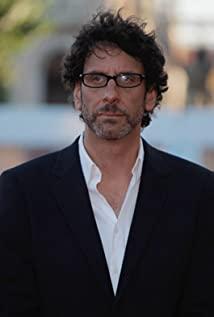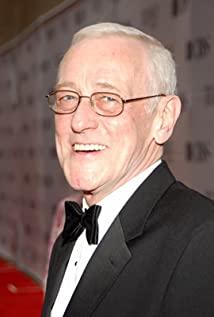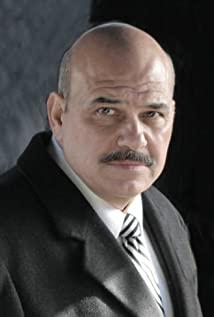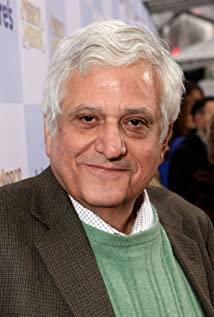This movie is very similar to Lynch's "Mulholland Drive". It tells the story of a young man who came to Hollywood with a dream, how his dream was broken in the end, and then he had hallucinations under huge mental pressure. However, compared with the horror and horror of "Mulholland Drive", "Barton Funk" is a black joke and irony. The image of a sour and repressed young man like Funk in it always makes people feel both sympathetic and can't help but laugh. .
Reality: Fink had a small success in New York, so he came to Hollywood with bigger dreams, hoping to become the great screenwriter he dreamed of. However, Hollywood is not what he imagined. There are too many people here, the industry is too developed, and the monopoly is too powerful. There is no hope for a small screenwriter like him to make a breakthrough. So he could only hide in a dilapidated hotel and write a script, eager to make a big hit. At this time, he learned that his idol Bill was also here, but he fell into a creative predicament and his reputation was destroyed. This cruel reality became Funk's biggest blow. At the same time, the impoverished Funk has no money, let alone a girlfriend, and his suppressed sexual desire has become the most painful thing for him. Under these enormous pressures, he looked at the portraits in the hotel and had hallucinations and dreams. In the end, the script was rejected, and the man fell into a meltdown.
Dreams: I think Charlie, detectives, weirdos in hotels, murders are all dream scenes. "A dream is the fulfillment of a wish", this is the core of Freud's theory. What Barton Fink wants is two things: 1. To become a famous screenwriter, a great writer, and to become famous; 2. To get the love of Audrey, to be able to get the love of a woman, to release his suppressed sexual desire. The second wish is again subordinate to the first wish. But in Hollywood, the huge and competitive film industry factory, as Fink tells his Broadway bosses and colleagues in the opening credits, it will only destroy art, leave no room for growth, and only deprive inspiration. On the surface, Fink, who was just and righteous, couldn't resist the restlessness in his heart. He still came to Hollywood, and his fate was unfortunately told by himself. And he also witnessed the idol Bill's disrepair here, addicted to alcohol, and finally died of depression. These stimuli remained deeply in Fink's mind. Compared with the filth and gold worship of Hollywood, the portrait of the beautiful woman with blue sea and blue sky on the wall forms a sharp contrast. It is as elusive as an ideal. This kind of scene is exactly in line with Fink's expectations. Perhaps it was Fink, who was hid in a dilapidated hotel day after day, and had such a strange dream while looking at the portrait.
Hotel: This dilapidated hotel should be directly derived from reality. It's just that although he comforted himself in the dream that he was invited, his subconscious was still reminding him with the producer's mouth: "What is that place, I have never heard of it." The only weird one in the hotel The waiter and the old elevator waiter are the dream projections of people who are squeezed and alienated by Hollywood's ugly mechanism. And the hotel is obviously full of guests, you can see shoes, you can hear voices, but you can't see anyone except Charlie. This is also the embodiment of Funk who has no relatives in Hollywood, is isolated and rejected, and hits walls everywhere - even if he calls No matter how loud you are, no one will take care of you.
Mosquitoes: In the movie, only Funk can see mosquitoes. These mosquitoes surround Funk tirelessly every night and every day. In the desert, why are there mosquitoes? No one else can see mosquitoes. This is an indirect reminder. The fact that we are in a dream state. These humming annoying mosquitoes may be the little things that bother him in Barton's real life. Those trivial troubles have been haunting him, and this has become a representation of a lingering disturbance in his dreams.
Producer: The producer in the dream should have the same image as in reality, stingy, despicable and aloof, monopolizing all resources. In reality, Patton should have been stomped on by the producer, so in his dream his wish came true, and he became the producer who praised him everywhere. The driven old valet should be Barton's reflection in reality. In the dream, the producer knelt on the ground and kissed his feet, begging him to write the script, but in reality it was the opposite. However, the final result is that the producer does not value things of artistic value at all, but prefers the intuitive and low-level B-level script - Patton's achievements have been severely trampled on, and personal freedom has been enslaved - this is how It is reality, the dream is slowly turning to reality, and the subconscious reminds the dreamer not to be too whimsical.
The great writer Bill and his wife Audrey: They should be more in line with reality. The melting pot of Hollywood has destroyed countless arts, and for the sake of fame and success, countless talented people have violated their conscience and morality to gain recognition, But it was still brutally eliminated. The collapse of the idol became Funk's heartbreak. Therefore, in his dream, Bill's death was told to him by others, and Bill had been vilified to a shameful point to buffer the dreamer's emotional fluctuations. Audrey is Bill's ghostwriter, and Fink's pursuit of Audrey is, first of all, the desire for successful works and career, and secondly, the release of sexual desire. In a hotel full of guests, why did Fink often hear the endless sound of the mysterious couple next door making love? He is depressed. But whether it is career desire or physiological needs, it is immoral here, so subconsciously, this pedantic traditional intellectual is very resistant to this bad habit. Under the double huge temptation, Fink and Audrey went to bed, but it also turned those trivial troubles (mosquitoes) into a direct and huge conscience-murder. Because Fink, who is pure in nature, cannot tolerate the smog of Hollywood to contaminate himself, and this sour intellectual cannot stand the temptation of such heretical ideas.
Charlie: Fink has never been recognized by the world, not recognized by the authorities, but recognized by the murderer Charlie. Charlie is also a person who has a huge gap with the world, so Charlie's recognition of Funk is a kind of psychological self-comfort. And the cowardly little intellectual Funk resented the destruction of art and dreams by this system. Therefore, Charlie roared for him, challenged the system for him, and killed the policeman who imprisoned him for him. In this sense, Charlie is an idealized avatar of Patton. He dares to show, is good at design, eloquent, has played with many women, and is extremely capable. But for this kind of imagination, Fink is obviously hesitant, after all, he is weak. So, Charlie said to him: "You come to my place, but you think I'm noisy", "If you need me, I'm next door". For this kind of crazy idea, it is obviously difficult for Fink to fully accept it, and it is detached.
Box: Charlie left Funk with a box that was never opened. What's inside? It may be the missing head, but symbolically, it holds Fink's most precious possession: his purest motives and original ideas—as he was on Broadway—not for fame and fortune, but for Passion to create art. When the thing that seduced him, Audrey, the woman who brought the script inspiration and sex, died, Fink was instantly inspired. Only by seeing the true heart can there be artistic creation. This is the belief that Funk has kept in his heart and adhered to. Although it was temporarily blinded and handed to Charlie, "it was originally your own thing, and I didn't give you anything", took back the box, No longer cared about the threat of the producer, and after looking down on everything, Fink found himself instead.
Portrait and Beach: The scene in the portrait in reality is Funk's ideal scene. When he let go of everything and got back his heart, Funk came to his ideal beach in a dream. Carrying a dream, facing a beautiful woman, the breeze is blowing, the waves sing, what a happy thing. This is the ultimate self-comfort and care that Fink finally obtained.
The ending of "Mulholland Drive" is a tragic event brought about by a broken dream. And "Barton Funk" is a dark humor full of bitterness and joy. After a series of setbacks, poor Funk still sees hope. The Coen brothers project their early experiences in Hollywood onto the protagonist, which is a work with a certain autobiographical quality. Of course, broader, as well as the criticism and irony of Hollywood contained in it.
For such a character as Fink, what we see is the bitterness and poverty of an oppressed low-level intellectual. Big dumb glasses, sour, crumpled ill-fitting suits, only leather shoes. After writing a satisfactory article, I was as happy as a child. Although it seemed out of place, I danced and shouted at the dance. Although pathetic and sighing, we can still see that Fink has a dream in his heart, and is excited and danced for it. The ups and downs of such a small person's fate are very flavorful.
View more about Barton Fink reviews


